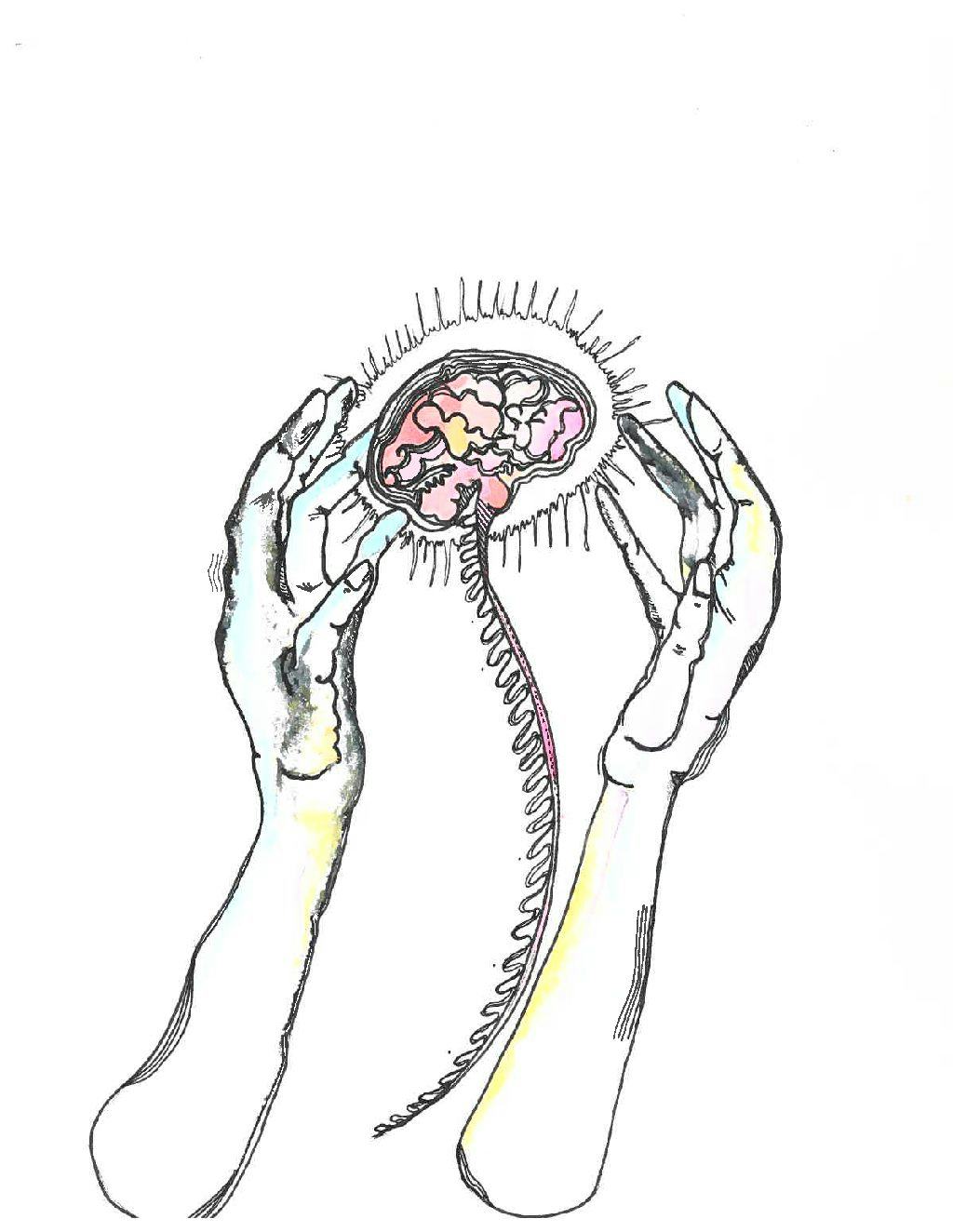You are not the same shape that you used to be.
Your body has grown solid. It’s filled out the peaks and valleys of your ribs and hips, and there’s a slight glow in your cheeks. It no longer reeks of illness. It no longer elicits pitiful stares from those who know you – knew you. It’s recognizable in a mirror.
Moments – quiet ones, loud ones, you remember the sudden onset of what seemed to be the end of the world as you knew it.
It was a sticky heatwave evening in late July, and you were visiting an old friend in Charleston, South Carolina. You were testing the boundaries of the picnic table that separated the two of you, angling your bodies towards one another to make up for all that distance that settled in over the years. The Hawaiian themed table cover bunching up beneath your drunken elbows, distorting the lippy red smiles of the hula girls as you lean in over plastic cup gin and tonics. Sucking on fingertips covered in hours-old barbeque sauce and sharing a smoke, a combination of relief and frustration in recounting how long it had been since you last saw each other against the dusty backdrop of New Mexico. You reminisce about when you played in a band together, and a mid-afternoon stopover in Roswell where you bathed in mid-spring sun and local tales of alien visitations.
That evening you crawl into bed and there is a tingle in your left foot. Heat radiates to the very tip of your big toe. The barely audible hum of the air conditioner fades into the background, obscured by the drip-dripping jungle and exotic Macaw calls emanating from the sound machine that is meant to put you to sleep. You feel a wave a nausea overcome you just as you begin to drift off. The tingling in your feet now overwhelming, you feel as if someone, or something, is in the room with you. You feel like it isn’t leaving anytime soon.
In the morning, you wake up and the tingling has subsided, replaced by a constant aching in your neck, which tightens its grip throughout the day. Your joints radiate, deep heat pools becoming a thick mass that undulates in the pit of your stomach. Your friend takes you to the airport that morning to catch a flight home. You spend the time in the sky trying to ignore the aggressive sensation that you need to get up and run. Run away from this feeling, this hot prickly anxious sensation that is simultaneously sitting like a rock inside of you, while swelling like a wave about to swallow you whole. When you arrive home that evening you feel the return of that presence, not going anywhere. You pace in the living room, struggling to catch a breath. You make a doctor’s appointment the next morning.
Your sneakers swish, swish, against the carpet, dragging rubber on polyester patterned with maroon triangles and yellow zig zags. Your body triggers the automatic doors, humming and clicking as they open and close one too many times from a faulty sensor. They think you’re still there. You watch your feet as you enter the waiting room. Your scuffed sneakers make you miss your boyfriend. You bought them in town that spring on a signature gloomy English day. The cobblestone streets shining slightly from a light mid-afternoon rain. You went to the movies and leaned back into that slow Sunday contentment. Legs draped over his waist, he snuck his index finger just beneath a run in your stockings, lightly stroking your knee.
While waiting for the doctor, the secretary hands you an iPad with a lengthy questionnaire flashing up at you. It makes you wince. In the last ten days have you felt like something bad is going to happen to you? In the past two weeks, have you experienced the following symptoms: anxiety, fatigue, a sense of hopelessness. If so, how often? You on paper seems unrecognizable. The doctor lightly swipes her fingers across the screen, accompanied by a low hmmmmm. You feel the room tilting as you mention the tight prickly sensation. The throbbing in your joints. The feeling as if someone else is in the room and is pushing down on your shoulders slowly until you finally fall to your knees and no longer have the energy to get up. She offers you an antidepressant.
In late summer, your boyfriend comes to visit. You have the feeling that things are getting worse but he insists it’s going to be okay. He doesn’t look up from his book when he says this to you. You feel scared, but his deep aggravated sigh keeps you from talking. Summer plans fall by the wayside and you retreat into yourself, forcing a smile over big American breakfasts and day trips together that feel like they are going to break you. You close your eyes forcefully every night hoping this feeling, this looming disease, will just go away.
But it doesn’t. A month before Christmas you move back to your hometown. Back to the street you grew up on. Back to your family. You repeat “this is only temporary.” A mantra. Just here for a little while so you can recover. But the presence is there, the one that feels like the beginning of the end. Your boyfriend says he didn’t want you to leave, but his flat, slightly unpleasant British accent sends the message that you, and your illness, are interrupting his life. Beneath a steady stream of uninterrupted tears comes a guttural animalistic sob. A sound you’ve never heard come out of you before. You repeat that you’ll miss him terribly, yet it’s as if your body won’t let you stay. It is forcing you to leave, tearing you out of the scene. Your guts are putting their foot down. You know that you can’t spend any more nights sitting alone in the apartment while he goes out for beers with his friends or stares silently into the television for hours on end. He and his stiff upper lip. Those days before you left there was a silence that filled every room of your shared apartment. A silence so heavy it filled up every possible corner of that space. It divided and lay heavy between you. Your once vibrant, youthful, and capable body has wasted into a fragile and delicate curve, like a crescent-moon, barely noticeable. It is no longer of interest to him.
You become too sick to work. You lose your job. Your father takes you to the job center where the man-in-charge cuts you a break and grants you nine months of unemployment. A stack of papers handed over a wide, heavily lacquered oak desk, the kind you imagine all bureaucrats have, tells you how to proceed in your quest for gainful employment. The sheer size of the desk makes the room seem unbearably small, creeping up towards the fiberglass drop ceiling, forcing you into panoramic view. The man wishes you well with a half-smile and you almost cry as you walk out of the office. Out of relief, but mostly because someone unexpected has recognized the pain you are in.
You talk to your boyfriend most days. Hanging feet off the edge of the bed, the computer balancing on your knees, open to receive an image of his tired face. The conversations are often centered around illness and he says he feels that he can’t connect with you like this. You wish you could stop talking about it but in that very moment you realize that’s all you really have anymore.
You try to make jokes about how you enjoyed a water aerobics class at the local gym geared towards an older crowd. Gentle stretches to relieve the weight of aging. Crinkled up eyes and folded smiles lift your spirits for a moment, but as you get out of the pool, a quick cold shock in the open air brings you back to reality and your heart sinks. You can’t manage to shake the idea that this is who you are now. An observer of your own life, too tired to actively participate. You feel that heavy silence, now even heavier with distance. You feel like something is wrong, not just inside of you, but everything else that surrounds you.
He lists off the reasons he’s been so absent. Reading, exams, job, no money. It’s stressful over here and you aren’t being a very supportive partner. He lets you know without saying that you’ve forced him to start looking elsewhere in your absence. But, it’s a place you’ve both been before. A place he’s been before. Long gone into the night, blurry eyed and with a new woman every chance he gets. You know, but you’re too drained to argue. You pay half the rent on your half-vacant apartment, so he doesn’t have to move. You attempt to lift the burden of illness from everyone in your life, except you.
The seasons change without you in mind. Christmas holidays are glowing distant auroras of blinking lights. No gifts under the tree. No New Year’s kiss popping champagne. Your boyfriend sends you a video of him and all his friends dancing in the kitchen as they celebrate the new year. You sit on the stairs and watch the blurry festivities between a bad connection and a few tears. You can hear the heartbeat of house music in the background and the rapid vacant tone of his voice that felt so familiar is now deeply alienating.
Weeks become months, dragging under paper hospital gowns. Dressing and undressing in the same office with aggressive white walls and speckled linoleum floors. You become the master of the automatic door, knowing exactly where the pointed toe must go to open the glassy gates. You know intimately each scuff of your sneakers, and they are no longer connected to the memory of a dreary English Sunday afternoon. They are now one with the maroon and yellow zig zag patterns of doctor’s office rugs. They are now part of the memory of being alone, legs draped over the side of a plastic waiting room chair, your own cold tingly fingers stroking your knee.
By spring, the sensation of cold steel and fingers pressing tightly under your throat has become a weekly routine. The doctor still can’t figure it out. They tell you over and over not to trust everything you read on the internet. But at night, when you can’t sleep, you look for answers. Forums, personal anecdotes, breathe life into the lives of those who come to dark quiet corners of the internet to share their experiences in disease.
From your bed you imagine the lives of this new, imagined community, you try and envision what their faces looked like before they lost themselves in a sudden illness. Were they bright and soft? Were they loved and gently caressed? Did they have someone to visit them? Did they have partners who stopped loving them when they could no longer stand up to the expectations of health? Did those partners leave when they lost all their charms from the relentless existence of being ill? Did they leave when they became shapeless, when they needed something? What was the pattern and the shape of the rug that got ripped out from under their feet?
You read on and on for hours, losing yourself in a constellation of symptoms that became a galaxy of information in a universe of deeply depressing stories.
*
Nine months after it all began, there is a shift. You see a doctor who identifies the problem. They articulate the disease in sharp textbook talk that you have become fluent in. For the first time in a long time, the presence that you have worn like a heavy winter coat in the dead of summer is gone. The air hits your skin. The cool relief hits hard. The medication takes a while to kick in, but the symptoms slowly start to fall away. You go for a walk that morning. You bask in the early, dim, end-of-winter sunrise. You catch a glimpse of yourself in the window of a coffee shop. There you are. But there’s something new about you. There’s an ache in your heart that feels crushing. It brings you to tears.
You begin to go back into the world. You still feel outside of yourself, a body in transition. Gingerly stepping forward, you get rid of the old Sunday sneakers and step barefooted and softly into the morning. Over the next few months, you try to pick up where you left off but your body is way ahead of you. It fills out, rapidly, bone shadows disappear under a new skin. The feeling of dis-ease returns when you go see your boyfriend. It’s short-lived. He stares at the ground in the presence of this new body. A new moon too bright to look towards in his dark space. He hangs low like a child being punished when you ask him just how many there were while you were away. Enough to count on both hands.
For a long time, the new shape is uncomfortable. Perhaps this is how it was always supposed to be. You were always supposed to be bigger. Perhaps that old folded over version of yourself was just acclimating to the narrow and restrictive spaces in which you choose to exist. You let it be. You let yourself get well.
You are not the same shape that you used to be.
Featured artwork by the author, Amanda Gray.
Amanda Gray is a writer and illustrator based in Providence, Rhode Island. After many years of covering arts and culture for various publications worldwide, Amanda now works as a carpenter and dedicates time to personal writing projects.
Discover more from Amanda Gray.









